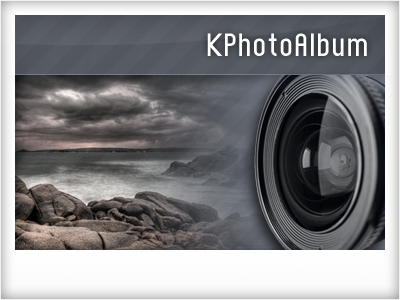KPhotoAlbum/gl
 |
KPhotoAlbum is a tool which you can use to easily sort your images. It provides many capabilities to make sorting and viewing images easy. |
Earlier versions of KPhotoAlbum were released under the name "KimDaBa". The current release is KPhotoAlbum version 4.4 (as of April 2014).
For an introduction, take the 3 minute KPhotoAlbum tour or see the Videos at KPhotoAlbum's Homepage. To learn more and view some screenshots read the FAQ.
KPhotoAlbum supports all the normal image formats including raw formats produced by most digital cameras and scanners (using dcraw to do the decoding). It is also possible to use the thumbnails embedded in raw images (that are usually of decent size and quality) for fast viewing so there is no need to decode the whole raw image.
Documentation
There is a 3-minute Tour and a set of How-To videos on the project site. A KPhotoAlbum handbook is also available as a PDF and on-line version.
KPhotoAlbum Downloads
Source packages, binaries for various distros, and snapshots are available from the project Download page.
KPhotoAlbum on Live systems like Knoppix
You can use an image file (or create your own) which integrates KPhotoAlbum in a Knoppix CD/DVD if KPhotoAlbum is missing there. The details can be found on the page KPhotoAlbum on Knoppix.
Extending KPhotoAlbum
- Image::Kimdaba is a perl module available on CPAN which parses the index.xml database.
- Write your own extensions to KPhotoAlbum
- Read Image::Kimdaba to download it and to see available scripts
- Another way to extend KPhotoAlbum is to write KIPI plugins (that are used also by other KDE photo applications). These plugins provide functions like exporting images to websites like Flickr, Picasa, Facebook, ... correcting exif date stamps or doing some other image manipulations. (KPhotoAlbum by itself does not touch the original files at all but preserves them intact).
- Other useful scripts are available from Wes Hardaker's site
- With Kimdaba2Mysql it's possible to:
- insert your index.xml metadata into a mysql-database
- generate a search-formular on your website with your kimdaba-keywords, example here
- Patches and features awaiting approval or implementation - Please use bugs.kde.org for that.
With pse3tokimdaba.pl it's possible to extract information from your Photoshop Elements 3 database to create an index.xml file. There are quite a few limitations, see the above page for more details.
djKPA is a Django web site designed to be the web interface of your KPhotoAlbum photo repository. The philosophy of djKPA is be as far as possible fully automatic: labels, tags, descriptions, ... of photo come from KPhotoAlbum. Nevertheless, djKPA is a real interactive application that allows your visitors to vote, post comments, show exif, ... and visit your photos by browsing the your Tags.
Help Develop KPhotoAlbum
If you are interested in helping the KPhotoAlbum development or related projects, please look at our this project page. Or, if you have an idea for a feature, please see the Feature Requests section, below.
Building KPhotoAlbum
Step-by-step guide to build KPhotoAlbum from source code on Debian or Ubuntu are available on page Building KPhotoAlbum.
KPA Release Steps
- Update the ChangeLog to mark the new release and add the key improvements to the list of changes, if they are not already mentioned in the ChangeLog
- Update doc/index.docbook to reflect the new release (if the documentation has been updated)
<releaseinfo>4.5</releaseinfo>
- Commit the last changes
git commit -v -a
- Tag the new release and push it out
git tag -a -m "kpa 4.5 released" v4.5 git push git push --tags
- Create a tar ball of the released sources using the instructions on the following section (kphotoalbum.rb --version 4.5)
- Upload the created tar ball to the incoming directory of upload.kde.org using an FTP client. The current instructions of notifying administrators of the upload are shown when logging in to the FTP server. You create a ticket and provide SHA sums and some other information of the upload.
- Add a new version to Bugzilla (bugs.kde.org, you have to have administrator rights to do this): Edit Products → KPhotoAlbum → Add version
- Update the KPA web pages to point to proper source file, you get a link to the mirroring system as when the uploaded tar to KDE FTP server has been processed. The sources of the web page can be checked out from svn+ssh://svn@svn.kde.org/home/kde/trunk/www/sites/kphotoalbum via svn.
- Publish the release information (KPA's web site, mailing lists, distributor's bugtracking system, social media etc.).
- Create a video of the cool new features and publish it on Youtube.
- Notify people building the binary packages for different distributions
Building a Release
Building a snapshot tar ball is rather straight forward. Install the releaseme building tool and run a command to generate the source package. As long as KPhotoAlbum is based on KDE 4, it's necessary to use the kdelibs4 branch.
git clone git://anongit.kde.org/releaseme cd releaseme git checkout kdelibs4
To create the source package, run e. g.:
./kphotoalbum.rb --version `date +%Y%m%d`
If a source package for a specific tagged version should be built, use that version number instead, e. g.:
./kphotoalbum.rb --version 4.6.2
Known Bugs
See the list of Bugs and workarounds in KPhotoAlbum.
Feature Requests
Please use bugs.kde.org marking the report as a "Wish".
Vídeo
KPhotoAlbum now supports videos as of version 3. This can be a bit tricky to get working, as it requires certain features from your KDE software setup. KPhotoAlbum Video Support will tell you how to get it working.
New Ideas for Future Versions
If you have a new idea for KPhotoAlbum and think that bugs.kde.org is not the right place for it, use one of the communication channels listed on the pages.
